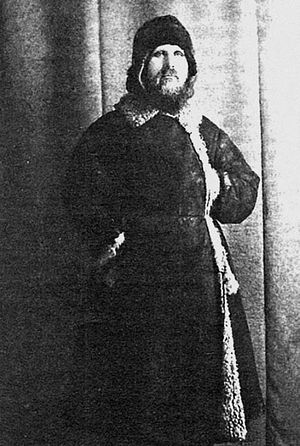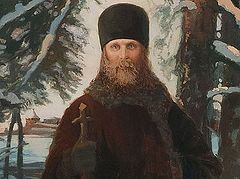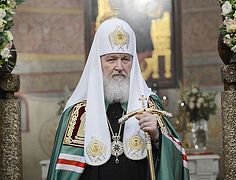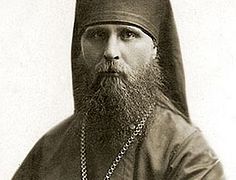The following commentary on persecution in Soviet Russia in general and against Met. Hilarion (Troitsky) in particular is from the book by Metropolitan Anthony (Khrapovitsky), The Prayer of the Russian Soul, published in the series “The Spiritual Heritage of the Russian Diaspora” by Moscow Sretensky Monastery in 2006.
 New Hieromartyr Hilarion at the Solovki labor camp. It is no longer a secret for anyone that there is now continuous and persistent persecution against the Church in what used to be Russia. The persecutors are not ashamed to violate moral laws: They arrest and exile both Church figures and laity to Solovki and Siberia’s Far North simply because they do not hide their Orthodox Christian disposition. There have been enough reports in the Russian and foreign press on the life of exiled metropolitans, bishops, priests and monks in Siberia. So, the Bolshevik hack writers are no longer able to refute these reports, which have turned out to be not only not exaggerated, but, on the contrary, even exposing but a few of these atrocities and in far less dark colors than they take place in reality.
New Hieromartyr Hilarion at the Solovki labor camp. It is no longer a secret for anyone that there is now continuous and persistent persecution against the Church in what used to be Russia. The persecutors are not ashamed to violate moral laws: They arrest and exile both Church figures and laity to Solovki and Siberia’s Far North simply because they do not hide their Orthodox Christian disposition. There have been enough reports in the Russian and foreign press on the life of exiled metropolitans, bishops, priests and monks in Siberia. So, the Bolshevik hack writers are no longer able to refute these reports, which have turned out to be not only not exaggerated, but, on the contrary, even exposing but a few of these atrocities and in far less dark colors than they take place in reality.
Nevertheless, insolence and cynicism have become part and parcel of the Bolshevik press to such a degree that its members do not deem it necessary to keep silent about their bloody crimes anymore. They find targets for their violence mainly among the most reputable, talented and popular figures; and it is only the unpardonable ignorance of our intelligentsia concerning all aspects of the life of the Church and the clergy that accounts for the fact that such events as causeless arrests of Church luminaries remain unnoticed in the press. The level of some of these Church luminaries is so much higher than that of ordinary theologians or hierarchs that if such representatives of secular circles were to suffer from the Bolsheviks, then it would have provoked an alarm concerning them that could be compared only to what came after the deaths of Dostoevsky or Pushkin (although they of course were not killed by the government, their deaths caused an irretrievable loss for Russian life).
The obscurantist Bolshevik system of persecution against the theological and philosophical talents and scholars of great authority is roughly as follows: these individuals, scrutinizing the reputation of a hierarch and preacher or a theologian and thinker, persuade him to speak publicly at some philosophical, theological or literary debate, promising them complete immunity, trying to provoke them with the difficulty of a contest of words because of the competence and skill of their atheist opponents.
Of course, our theologians and hierarchs—bishops, archimandrites and priests who used to teach theological and philosophical subjects in the Theological Academies or simply in the world, have much to say to their opponents as to “preparatory students” (as one of my trustworthy correspondents from Russia has characterized them). After the first or second debate these “preparatory students”, though they may have gray beards, angry faces and technical qualifications of all sorts, become confused and quail at the arguments and questions of the apologists of faith to such a degree that, at the behest of their Red masters, they refuse to continue participating in the debates; so the religious representatives invite opponents, bold yet absolutely ignorant in matters of faith and theology, to follow debates in vain.
This theology has recently lost one of its strongest representatives—Archbishop Hilarion (Troitsky), a very young yet highly talented thinker, if not a genius. This young archpastor, who starved to death in December 1929, had earlier been in exile in Solovki, from where just before his death he was hypocritically released and sent to Petrograd, where he died on December 15 [December 28 according to the new calendar.—Ed.] not yet forty years of age. In the final years of his life he walked on crutches, though he had been robust from his youth and had ruddy cheeks like those of a youth.
For the Bolsheviks he was particularly dangerous because he was cheerful by nature, had a general erudition (extraordinary for his young age) and would gather huge audiences around himself wherever he went, especially of young people. This is something the Bolsheviks are afraid of and dislike most of all, as they hoped to extend their influence on minds through young people.
Archbishop Hilarion especially put them out by the fact that in his brilliant lectures and speeches he substantiated and defended the infallibility of the Holy Church (the dogma they hated most). He masterfully connected this dogma with commentary on the New Testament, namely the on the Gospels, the Acts, and the Epistles of John the Evangelist—that is, the very sacred books that the cunning and obstinate Protestants use to oppose Church discipline and the ascetic dispositions of our Church.
There is a good German expression: “Epochenmachendes Buch” (“an epoch-making book”).
Several years before the Russian Revolution a magazine article (and later—an extensive booklet) entitled, Christianity or the Church, by the then Archimandrite Hilarion, was precisely this kind of book. In it he irrefutably proves (much against the prejudices adopted by scholars) the prevalent, or predominant, role of this doctrine not only in Holy Tradition—our Tradition, which the Lutherans and other Protestants call “monastic”—but also in the Apostle Paul (to whom they like to refer most often), in the Holy Gospel, and even in the Book of Revelation.
Unfortunately, our professors of theology have grown so old, if not by their age, then especially by their links to medieval scholasticism, which has infiltrated our Church through the Catechisms of Lavrenty Zizany, Peter Mohyla, and Metropolitans Philaret and Macarius of Moscow, that they have virtually lost the ability to respond to any fresh theological thought, and, grinding their teeth with annoyance, keep clear of this thought only to the Bolsheviks’ joy. It would seem that this suppression was difficult to carry out, particularly in relation to the treatises of His Eminence Hilarion, who supported his book, Christianity or the Church, with the enormous volume of his thesis, “The Teaching of the Church in the First Three Centuries of Christianity”.
And no special review was written in our literature about this book, as with the preceding booklet, except for the responses of official opponents during debates. Though these opponents lavished praise on the then very young author, in the end they asserted that the mentioned thesis was of a “super-master’s” or even “doctoral” level. Meanwhile, the author has only been awarded a master’s degree so far; firstly because the conferment of a doctorate along with a master’s degree at the Academy was an extraordinary phenomenon; and, secondly, as the opponents sincerely admitted, they wanted him to have a strong impetus to tackle a doctoral thesis as a separate work.
The author of the mentioned works, His Eminence Hilarion, who despite his youth was awarded by the Patriarch and the Synod with the rank of archbishop and made a sort of Patriarchal assistant, or deputy administrator of the Moscow Diocese, continued his debates with the Bolsheviks with the same fervor and ever increasing success. Not only did he beat them with his brilliant intellect, the irresistibility of his arguments and facts, but he also captivated them with his charming personality and artless sweetness.
The Bolsheviks understood that it would be hard for them to destroy religion as long as there were such strong defenders of it; so they arrested the young hierarch without further ado, even though he was most utterly loyal to the so-called Soviet government.
They committed a similar act of gross violence and violation of their own laws towards yet another learned young hierarch, His Eminence Procopius, Bishop of Elisavetgrad [the name of the city of Kirovohrad in central southern Ukraine until 1924.—Trans.], who was roughly Archbishop Hilarion’s same age. I do not know whether he is still alive or dead, like Met. Hilarion, along with thirty other bishops who died in the cold and starvation of penal servitude on Solovki or in the Siberian tundra, where the elderly Patriarchal Locum Tenens, Metropolitan Peter (Polyansky), still languishes on the island of Khe near the mouth of the Ob River—although he is a fully legitimate hierarch even from the Soviet standpoint.



